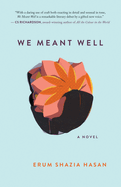
Canadian author Erum Shazia Hasan explores the complex moral and ethical quandaries facing a humanitarian aid worker in her powerful debut novel, We Meant Well. The setting is Likanni, a village in an unnamed country, a former French colony characterized by lush beauty, poverty, and war, and the narrator is Maya, a 30-something from Los Angeles who works for an international charitable organization based in Geneva, one that is recognizable by its "fancy blue logo." She was adopted as an infant from Bangladesh by a wealthy American couple, and grew up a white girl trapped in a brown body with no understanding of her heritage and roots. A woman with immense empathy, she chafes at the severely restricted donor-friendly scope of her job, which is simply to focus on running the charity's orphanage and not concern herself with underlying problems plaguing the village.
Maya oversees operations in Likanni from her luxury perch in the Hollywood Hills until she is summoned to the village by her superiors to investigate a rape allegation against one of her colleagues, Marc. Protestors surround the charity's office, demanding justice. A public relations fiasco would affect donations to the organization, and Maya is instructed to "be responsive to the aggrieved beneficiaries while protecting the brand."
Readers may question Maya's choices as she tries to untangle the truth of what happened, while facing bureaucratic pressure to evacuate Marc and quickly resolve the crisis. Hasan tantalizes readers: she opts not for a neat and tidy ending, but instead positions her characters for a destiny-defining reckoning beyond the page. --Shahina Piyarali, reviewer

